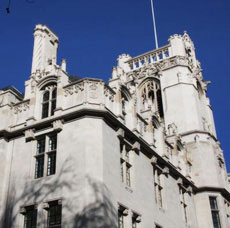Public Law Project appeal against the Legal Aid residence test allowed in Supreme Court
The Law Society Gazette reported today that the Government has been defeated in the Supreme Court over the proposed Legal Aid residence test.
 The legal challenge against the residence test was brought by the Public Law Project, represented by barristers Michael Fordham QC, Ben Jaffey, Naina Patel and Alison Pickup and its solicitor, John Halford of Bindmans LLP.
The legal challenge against the residence test was brought by the Public Law Project, represented by barristers Michael Fordham QC, Ben Jaffey, Naina Patel and Alison Pickup and its solicitor, John Halford of Bindmans LLP.
According to the Law Society Gazette, in an "unusually swift decision", the Supreme Court today granted the appeal on the grounds that the residence test was ultra vires. Bindmans' John Halford told the Law Society Gazette he could not recall the Supreme Court allowing an appeal "on the spot like this. It's totally unprecedented."
The hearing had been scheduled to last two days and the Law Society Gazette says it understands that the Government will now decide whether to return to court tomorrow.
A brief news article published this evening on the Supreme Court website stated:
"The issues in this appeal (see Case details ) were whether the proposed civil legal aid residence test in the draft Legal Aid, Sentencing and Punishment of Offenders Act (Amendment of Schedule 1) Order 2014 is:
1. ultra vires the enabling statute and
2. unjustifiably discriminatory and so in breach of common law and the Human Rights Act 1998.
At the end of today's hearing the The Supreme Court announced that it was allowing the appeal on ground (1) and full written reasons for the decision will follow in due course.
Following its decision on ground (1) The Supreme Court asked the parties whether they wished to address the Court on the second issue, ground (2). The case has been adjourned while this is considered. The case may therefore not continue tomorrow."
The Law Society responded to the news on Twitter by saying the residence test was "repugnant to the principle of equality before the law and the right to equal protection of the law."
In a Bindmans press release, John Halford was today quoted as saying: "The British legal system is rooted in two fundamental principles - that all equally enjoy the protection of ours laws and all are accountable to our Courts. The Lord Chancellor takes an oath of office to honour these principles, but planned to undermine them by withholding legal aid from those who failed his residence test, leaving them powerless to enforce legal rights in the most compelling cases. Yet today, after minutes of deliberation, seven Justices of our highest court held him accountable, ruling he was acting in a legal vacuum and without Parliamentary authority. They were right to do so - rationing British justice using a residence test is repugnant to British law.”
A spokesman for the Ministry of Justice was quoted by the Independent as saying: "This Government believes that, in principle, individuals should have a strong connection to the UK in order to benefit from the civil legal aid scheme. We believe the residence test proposed during the previous Parliament is a fair and appropriate way to demonstrate that connection."
Under the residence test proposed by the former Lord Chancellor, Chris Grayling, a person would be required to have lawfully lived in the UK for more than 12 months to be eligible for legal aid, though certain categories of individuals, including asylum seekers, would be exempt from the test.
The Public Law Project earlier published a Q & A on the residence test here. More background on the test and today's appeal is available here on the Guardian.
As we reported in November, the case came before the Supreme Court after the Court of Appeal allowed the Lord Chancellor's appeal against a 2014 High Court judgment which found the residence test to be unlawful and discriminatory.